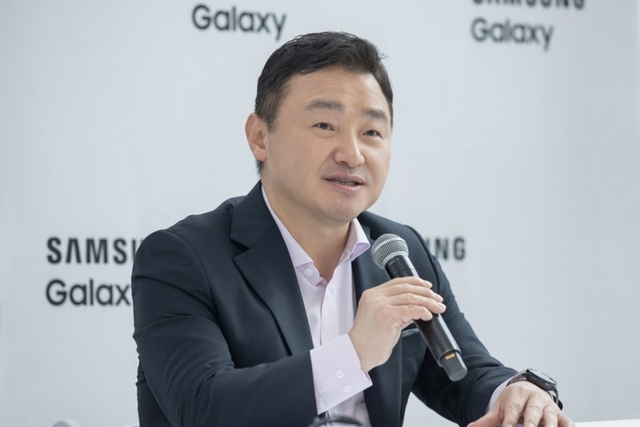Business
Samsung To Aim For Over 50 Per Cent Share In India's Super-Premium Price Segment In The Smartphone Market
- While the smartphone market has experienced sluggishness in the first half of the year, the premium and high-end segment has shown strong demand.

Dr TM Roh, President and Head of Mobile eXperience Business at Samsung Electronics. (Image: Samsung)
Korean electronics brand Samsung plans to capture over 50 per cent of the super-premium price segment (above $1000) in India.
Currently, the brand holds a 35 per cent market share in this segment, making India one of its fastest growing and largest markets.
Dr TM Roh, Samsung's president and head of MX (Mobile Experiences) business, expressed confidence in achieving this goal with the launch of their latest foldable smartphones.
He announced the company's intention to solidify their leadership in the foldable smartphone market in India. Roh stated that with the introduction of the new and improved Galaxy Z Fold5 and Z Flip5 in the second half of 2023, they aim to further establish their dominance in this segment.
The executive highlighted that the adoption of foldable smartphones as a replacement for conventional bar-type phones will largely depend on the Indian market.
Samsung is closely monitoring the market dynamics and consumer preferences to determine the optimal timing for this transition.
Roh predicts that the foldable segment will witness significant growth, with an estimated 30 million units of cumulative sales in 2023. He believes that this year will be a tipping point for foldable smartphones, as they become a mainstream category.
Furthermore, he anticipates that the foldable form factor will expand beyond smartphones to other devices like tablets and PCs in the future.
According to market research organisations, the foldable segment is projected to become mainstream within the next five years, with over 100 million units sold annually. To achieve this, the company is collaborating with strategic parts suppliers to make the form factor more affordable.
The foldable market is already on its way to becoming mainstream, as evidenced by third-party applications optimising their experiences for foldable devices. This increased traction in the global market is a positive indicator for the future of foldable technology.
In an effort to promote sustainability, the latest foldable smartphones are incorporating upcycled materials such as plastics made from fishing nets. Samsung aims to have 50 per cent of the plastic parts or products using recycled resin by 2030.
Currently, the use of recyclable plastics has minimal impact on raw material prices, but as Samsung increases its procurement of environmentally sustainable materials, there may be implications for end-user prices.
While the smartphone market has experienced sluggishness in the first half of the year, the premium and high-end segment has shown strong demand. This has led to a 22 per cent sequential decline in profits for the mobile business in the quarter ending June.
However, growth is expected in the second half of the year, providing optimism for the overall market.
Roh anticipates a slow recovery in the second half, aligning with the global market's pace of recovery. However, he acknowledges that the recovery may not be as fast as desired.
He emphasises the importance of India as a strong market for premium products, stating that it will play a critical role in the company's success. To achieve this, Samsung is actively working on strengthening its partnerships with both online and offline partners in the Indian market, he adds.
Roh highlights the sensitivity and openness of the Indian market to innovation. He notes that Indian consumers have a long history of using mobile devices and have shown a rapidly growing demand for high-end premium products.
Regarding manufacturing, Roh acknowledges India as a significant manufacturing center for Samsung electronics, particularly mobile devices. The company's latest foldables, watches, and tablets are being produced in their Noida factory.
Roh explains that the Noida factory supplies not only to the Indian market but also the rest of the world, with the complete global line-up of Samsung products.
He mentions that any future plans for manufacturing expansion in India will depend on market conditions and regional requirements, aiming to find the optimal region and supply chain for each market.
Support Swarajya's 50 Ground Reports Project & Sponsor A Story
Every general election Swarajya does a 50 ground reports project.
Aimed only at serious readers and those who appreciate the nuances of political undercurrents, the project provides a sense of India's electoral landscape. As you know, these reports are produced after considerable investment of travel, time and effort on the ground.
This time too we've kicked off the project in style and have covered over 30 constituencies already. If you're someone who appreciates such work and have enjoyed our coverage please consider sponsoring a ground report for just Rs 2999 to Rs 19,999 - it goes a long way in helping us produce more quality reportage.
You can also back this project by becoming a subscriber for as little as Rs 999 - so do click on this links and choose a plan that suits you and back us.
Click below to contribute.
Latest